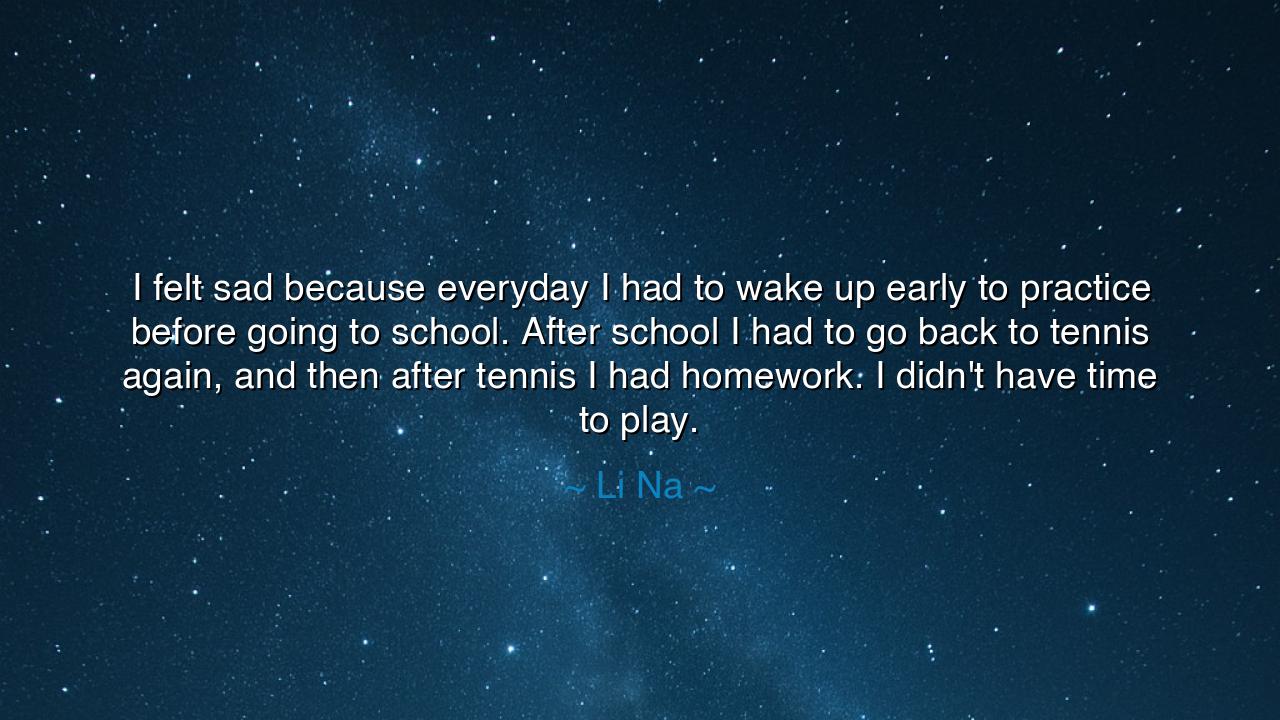
I felt sad because everyday I had to wake up early to practice
I felt sad because everyday I had to wake up early to practice before going to school. After school I had to go back to tennis again, and then after tennis I had homework. I didn't have time to play.






The words of Li Na, the great champion of tennis, reveal a truth often hidden behind the glitter of success: “I felt sad because everyday I had to wake up early to practice before going to school. After school I had to go back to tennis again, and then after tennis I had homework. I didn’t have time to play.” In this confession, she unveils the heavy cost of discipline, the sorrow of a childhood sacrificed at the altar of greatness. Many see only the trophies raised high, the glory of victory, yet within the heart of the champion lies the memory of sacrifice, of playtime lost, of youth exchanged for mastery.
The origin of these words is not merely personal but universal. They echo the cry of countless children molded into prodigies—athletes, musicians, scholars—whose days are filled not with games and laughter but with endless training. To achieve what others cannot, they must surrender what others take for granted. Li Na speaks not as one ungrateful for her talent, but as one who remembers the loneliness of a childhood burdened with expectation. In her sadness lies a timeless truth: even the path to greatness is paved with grief.
The ancients understood this paradox. The young Spartan boy, taken from his mother at the age of seven, entered the agoge, where play was replaced by training, and childhood by preparation for war. He, too, lost the joys of freedom, yet from such discipline arose warriors who stood unbroken at Thermopylae. Their greatness was forged through deprivation, yet who can deny that in their hearts they too longed for the laughter of ordinary youth? Li Na’s lament is thus ancient in spirit: the sorrow of one who has borne too much, too soon, in service of a greater destiny.
History also gives us the story of Wolfgang Amadeus Mozart. From the age of three, he was trained relentlessly by his father, paraded before kings, forced into hours of practice that left no room for the carefree games of childhood. His genius gave the world immortal music, but his life was marked by exhaustion and sorrow. Like Li Na, he might have said: “I didn’t have time to play.” And yet, the world received his gift because he paid the price. This is the tension at the heart of greatness—the gift to the world is often purchased with the joy of the self.
Yet Li Na’s words also awaken compassion and wisdom. They remind us that discipline without balance can wound the soul, that even in pursuit of excellence, the heart requires room for play, for laughter, for rest. For what is the purpose of greatness if the one who achieves it carries sadness in their core? The lesson here is not to abandon discipline, but to temper it with humanity, to remember that joy is as essential as duty in shaping a whole life.
The lesson for us is clear: pursue your dreams with diligence, but do not sacrifice all upon the altar of ambition. Make time for the simple joys of life, even when striving toward lofty goals. For the child who never plays becomes the adult who forever hungers for what was lost. Let us honor the balance between labor and leisure, between striving and savoring, lest we awaken one day to find that victory has left us hollow.
Practical action lies before us: parents, teachers, and leaders—do not demand so much of the young that their joy is crushed. Encourage discipline, yes, but also allow space for laughter and rest. And for ourselves, when ambition drives us, pause to breathe, to delight in small pleasures, to play in the brief moments life grants us. For in that playfulness lies renewal, and without it, even the strongest spirit may wither.
So let us take to heart Li Na’s quiet confession. Behind every crown lies sacrifice, behind every triumph a story of sorrow. May we learn not only to honor the greatness born of discipline, but also to cherish the humanity that requires laughter, freedom, and the gift of play. For in the balance of these two—the toil of practice and the joy of life—true greatness finds its noblest form.






AAdministratorAdministrator
Welcome, honored guests. Please leave a comment, we will respond soon